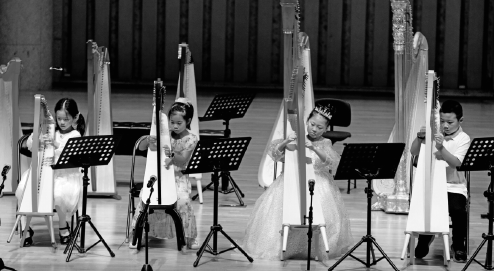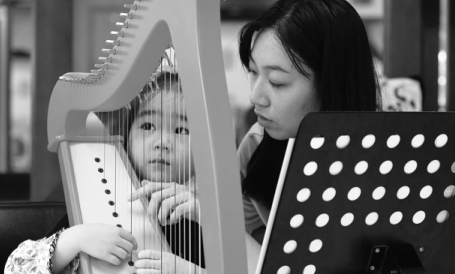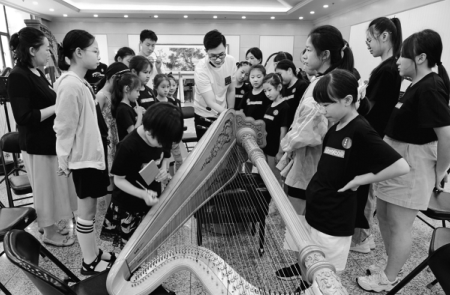Worth harping on about
A musical instrument unlike any other, its chords can enchant as well as attract admirers, Chen Nan reports.

In 2011, when harpist Wang Guan launched a training program at the Forbidden City Concert Hall in Beijing, during the Gateway to Arts Summer Festival, there were only about 30 students and none of them knew anything about the musical instrument.
For Wang, who teaches at the Central Conservatory of Music in Beijing, this was not a surprise.
"The musical instrument is less well-known in China, compared to other Western musical instruments, such as the piano and violin. I can still recall that along with my colleagues, we started from zero to introduce the harp. It was a challenging process but very rewarding," says Wang.
Now, a decade later, the 10th harp summer camp program, which lasted for four days, concluded with a concert performed by students at the Forbidden City Concert Hall on July 22.
Over 70 students, from ages 5 to 15, from the harp summer camp, performed as soloists, duos and chamber music groups. Pieces enchanted the audience such as Little Star adapted from the famous lullaby Twinkle, Twinkle, Little Star, composed by Mozart based on English poet Jane Taylor's poem of the same title, and My Dancing Days, a suite for harp ensemble arranged by harpist Skaila Kanga.
"I'm happy to witness the changes and a growing number of harp students over the past 10 years. We let students share classes together since it's a good way to learn from each other. When they produce sounds together in harmony, they are happy too and encouraged to continue to study the musical instrument," says Wang, adding that the students traveled from different parts of China to attend the summer camp, such as Yunnan, Shaanxi and Hebei provinces.
Last year, due to the coronavirus pandemic, the summer camps organized by the Forbidden City Concert Hall during its annual Gateway to Arts Summer Festival were canceled and moved to online courses.
To Wang's surprise, it helped to expand a fan base for the musical instrument since many people didn't need to travel to Beijing to attend the classes.
Wang learned to play the piano at the age of 3, and the guzheng, or Chinese zither, at 4. She was enrolled to study at the primary school affiliated to the Central Conservatory of Music when she was 10. That was when she was first introduced to the harp by her piano teacher.
Like many harp students, she enjoys the instrument's sound and it was a smooth transition for her to learn to play it. Now, her 8-year-old daughter is also learning to play the harp.
One of the students in the harp summer camp is Youyou, who was introduced to the musical instrument after she attended the summer camp in 2017 for the first time. Her mother also joined in the harp summer camp to study along with Youyou.
"Every summer vacation we learn to play the harp together. We are like friends playing together, which is fun," says the mother, who, along with her daughter, played The Merry Widow Waltz by Hungarian composer Franz Lehar, during the concert on July 22.
Gu Yingshuo, a 16-year-old boy from Xi'an, Shaanxi province, is a loyal fan of the harp summer camp. He not only developed his harp study as a hobby but also decided to launch a professional career as a harpist. Now, he is a student of the middle school affiliated to the Xi'an Conservatory of Music.
"The musical instrument helps me to express myself beyond words and when I play it, I feel relaxed since the sounds of the harp are soothing," says Gu.



Today's Top News
- China marks milestone in developing complex deepwater oil and gas reservoirs
- China remembers victims of Nanjing Massacre, 88 years on
- New plan will be a road map for a stronger future
- Taiwan's character of the year a vote against confrontation
- Strengthened resilience key for economy
- Video sheds new light on Japan's wartime atrocities






























